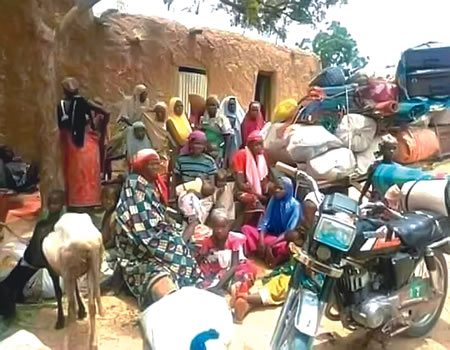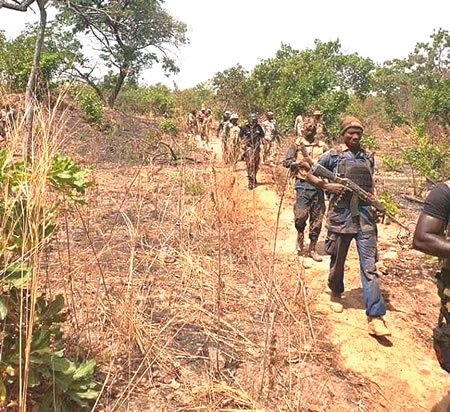Last week, Governor Abdulaziz Yari of Zamfara State gave a graphic account of the mayhem unleashed on the people of the state by bandits. He disclosed that 3,596 lives have been lost, while 500 villages have been destroyed and 10,000 people rendered homeless in the last eight years when bandits took over the control of some parts of the state.
Who are the perpetrators of these heinous crimes and what is their motive? These are questions that are continuous on the lips of the citizens of the state. Although it is difficult to pin down the cause(s) of the persistent killings in the state, but findings revealed that they are multi-faceted.
Bandits started as political thugs
Some citizens of the state said the root of the killings could be linked to when the hoodlums were used and dumped by politicians in 2011. Those with this opinion said the politicians failed to keep to their promises to the bandits. They liken the problem to “use and dump” which they claim happened in Borno State with the deceased leader of Boko Haram, Mohammed Yusuf, who was allegedly used and dumped and eventually killed.
Saturday Tribune gathered that the late Buhari Daji, who was the head of the bandits terrorising the state, felt that he and members of his gang were betrayed. So they were said to have resorted to criminality as a way of making ends meet. Eventually, he too was used and dumped and killed at the end. He was said to have told his killers that his death would not end the killings in the state but rather, it would worsen the situation.
Indeed, since his death the mayhem visited on the state by the hoodlums in the last two years has been unprecedented.
A religious scholar and Chief Imam of Muslim Foundation mosque in Gusau, the state capital, Sheikh Tukur Sani Jangebe, however has a different perspective to the crisis. He was of the opinion that the incessant killings couldn’t have just happened, saying the people must have sinned and must seek God’s salvation. When Saturday Tribune asked his opinion on the spate of killings in the state, he was short of words but asked: “could this be the state that introduced sharia?”
Recalling, how he said they toiled day and night to implement the sharia legal system in the state and how the state had turned, he expressed the belief that something must be wrong. He asked individuals in the state to review their relationship with God and repent.
The chairman, Zamfara State Forum, Abba Muhammad, also linked the current crisis to the sin of defacing the Holy Quran with human faeces. He described the action as “despicable and condemnable.”
According to him, the defacing of the Holy book took place on three different occasions. The first, he said happened at Farida Hospital in Gusau, while the second was discovered at Shettima Model Primary School and the third at Zureb, all in the state capital. “The perpetrators of these heinous crimes would tear some parts of the Quran into several pieces and dump them into soak away and toilets,” he claimed.
He said “we can’t escape God’s anger. We have offended God. How do we expect Him to intervene in the killings that have engulfed the state since 2011? Definitely, God is not happy with the people of the state.”
He told the Saturday Tribune that the injustice allegedly carried out in relation to the defacing of the Holy Quran was worrisome because a local government chairman and a councillor, who were initially arrested and taken to prison, were later cleared of any wrongdoing whereas many believe that they have a case to answer.
He said “initially, the duo were arrested and taken to prison. People were jubilating that the government had done the right thing only for the people to later learn that they were exonerated of any blame while others perceived to be innocent were the ones languishing in prisons.” He held that “for God to be happy, the case must be revisited. Let those involved be prosecuted.”
It was learnt that the local government boss had returned to his seat but the general belief was that he was also guilty of the alleged crime. Investigation carried out by Saturday Tribune revealed that those believed to have been made scapegoats have a sentence passed on them.
The Zamfara Forum boss told Saturday Tribune that even though the sentence had been passed on some of the accused, it is yet to be carried out because of the controversies surrounding the whole case.
Traditional rulers to blame
Apart from the above, another school of thought argues that the marauding hoodlums are being shielded by some traditional rulers. A lecturer and public affairs analyst, Musa Dansadau, attributed the escalation of the killings to the role of some traditional rulers in the state. He claimed that they had protected the bandits by giving them shelter and had accommodated them in their respective domains.
For instance, on November 30, 2018, seven traditional rulers were deposed for this offence. The Zamfara State Commissioner for Local Governments and Chieftaincy Affairs, Bello Dankande, who announced this while briefing journalists in Gusau, listed the affected monarchs to include the district heads of Ruwan Gora, Isa Balarabe, Ruwan Rana, Altine Magaji and that of Ruwan Jema, Mohammed Sani. Others were Bala Magaji, village head of Gurbin Bore; Marafa Zubairu, village head of Baichin Birane; DanjekaGyado, village head of Gyado; and Hassan Mohammed, the village head of TungarDutsi.
The dethroned traditional rulers were said to have been guilty of harbouring and feeding bandits in their palaces while giving information on the movement of security personnel to the bandits as well as getting bail for those arrested among them. Dankande noted that their removal was in tandem with section 15 (1, 2 & 3) of the state’s local government law.
However, according to Dansadau, since their dethronement, “we have not heard of anything from the state government whether they have been prosecuted or not. In addition, we have not heard of any monarch being arrested or dethroned.
House owners charge bandits N50,000
House owners and informers have continued to play critical roles in the crisis. A senior police officer, who pleaded for anonymity, said “one finds it difficult to relate with the natives because most of them are either giving the hoodlums houses for rent or are their informers. Several times, the police officers had cause to address the people to tell them to stop, but because they are paid handsomely by the bandits they would not stop.”
According to him, “house owners receive N50,000 as house rent from the bandits monthly. So renting out to the bandits is a lucrative business as well as becoming their informer.”
The recent emergence of a teenager at Tsauni village in Tsafe Local Government Area, who has “bulletproof charm” and has been selling it for N500, has added another angle to the raging crisis. The village, it was gathered, has turned to a Makah of sorts as people now besiege it from all walks of life and from all parts of the state to collect the charm. The activities of the teenager have, however, attracted mixed feelings from the people of the state.
To some, the teenage boy is like a “saviour” because of the incessant attacks in parts of the state. To others, his activities amounted to encouraging the bandits to continue in their crime since the bandits would know the presence of the boy and would want to prove that his charm is fake.
Alliance between miners and bandits
However, the recent suspension of mining activities in the state by the Federal Government has ruffled some feathers, especially many pundits who believe that those mining were foreigners and responsible citizens of the state. However, Dansadau said government had found that the desire to acquire more mining sites by the illegal miners had led to an unholy alliance between the bandits and the illegal miners.
The commissioner said it was discovered that the bandits were now involved in mining and noted that if their activities were not arrested in time by the state and federal governments, the issue of banditry would become more complicated. He said it was for this reason that the state governor, Abdulaziz Yari said he welcomed the ban and advised that it should be enforced.
On its part and concerned by the plight of the people of the state, the federal government has vowed to end the carnage in the state. The military recently renewed their onslaught against the criminals in some Northern states including Zamfara.
Also, the Inspector General of Police, Muhammad Adamu, had during a town hall meeting with critical stakeholders, reiterated the resolve of the security agencies to end all forms of criminal activities in the state.
Will these renewed efforts by the government lead to the end of the killings? Some stakeholders in the state believe that the answer to this question lies in the federal government re-strategising if it really wants to end the killings.







